

A professor of psychology at Illinois has been recognized as a rising star in her profession.
Joey Cheng has been named a 2016 Association for Psychological Science Rising Star, an award reserved for outstanding psychological scientists in the earliest stages of their research careers. Cheng earned her doctoral degree from the University of British Columbia in 2013, and joined the U of I faculty in 2015.
Her research centers on human social status and the distinction between dominance and prestige in social hierarchies. Cheng’s findings indicate that status competitions within groups favor the rise of skilled individuals who draw the greatest respect as well as coercive individuals who instill fear via force and threat.
“My work focuses on developing an account of human social status that incorporates how natural selection and cultural processes have jointly shaped individuals’ status psychology—and how this in turn affects group decision-making,” Cheng said.
In a recent study, published in Journal of Experimental Psychology: General, Cheng and colleagues found that people who lowered their vocal pitch in the initial moments of a leaderless group interaction were more likely to be seen as dominant and influential than those who raised their vocal pitch early in conversation.
By contrast, however, pitch changes were unrelated to the prestige of the speaker. These findings suggest that these two distinct forms of status have different nonverbal signals. Cheng explained that understanding the contrast between prestige and dominance is important because, despite the dramatic differences in their underlying psychological and behavioral processes, prestige and dominance coexist to influence the social ranking of individuals within human social groups.
“Much of our current understanding assumes that human status is simply an extension of dominance hierarchies seen in other primates”, Cheng said. “However, a large enterprise on culture and cultural transmission has proposed that humans’ immense reliance on cultural learning—the tendency to acquire ideas, beliefs, practices, and knowledge from others—has led to the emergence of a separate form of status, called prestige. It explains why people preferentially defer to and are persuaded by individuals who are particularly successful, skilled, and knowledgeable in locally valued domains.”
Cheng said colleagues in the Department of Psychology and elsewhere on campus helped pave the way to this award.
“I am really honored and flattered to be selected as one of the Rising Stars. My work relies on the insights, knowledge, and foundation laid down by many of my collaborators, so much so that I feel deeply indebted to them for their contribution to our work together that has led to this award,” she said.
Cheng looks forward to developing an increasingly multi-disciplinary framework for understanding human social relationships.
“With my current network of coauthors—who come from diverse disciplines, including anthropology, economics, sociology, organizational science, neuroendocrinology, and computer science—my hope is to continue to develop new projects that combine different methodologies and integrate perspectives from disparate disciplines into a much broader and unifying framework for explaining human behavior and psychology,” she said.


